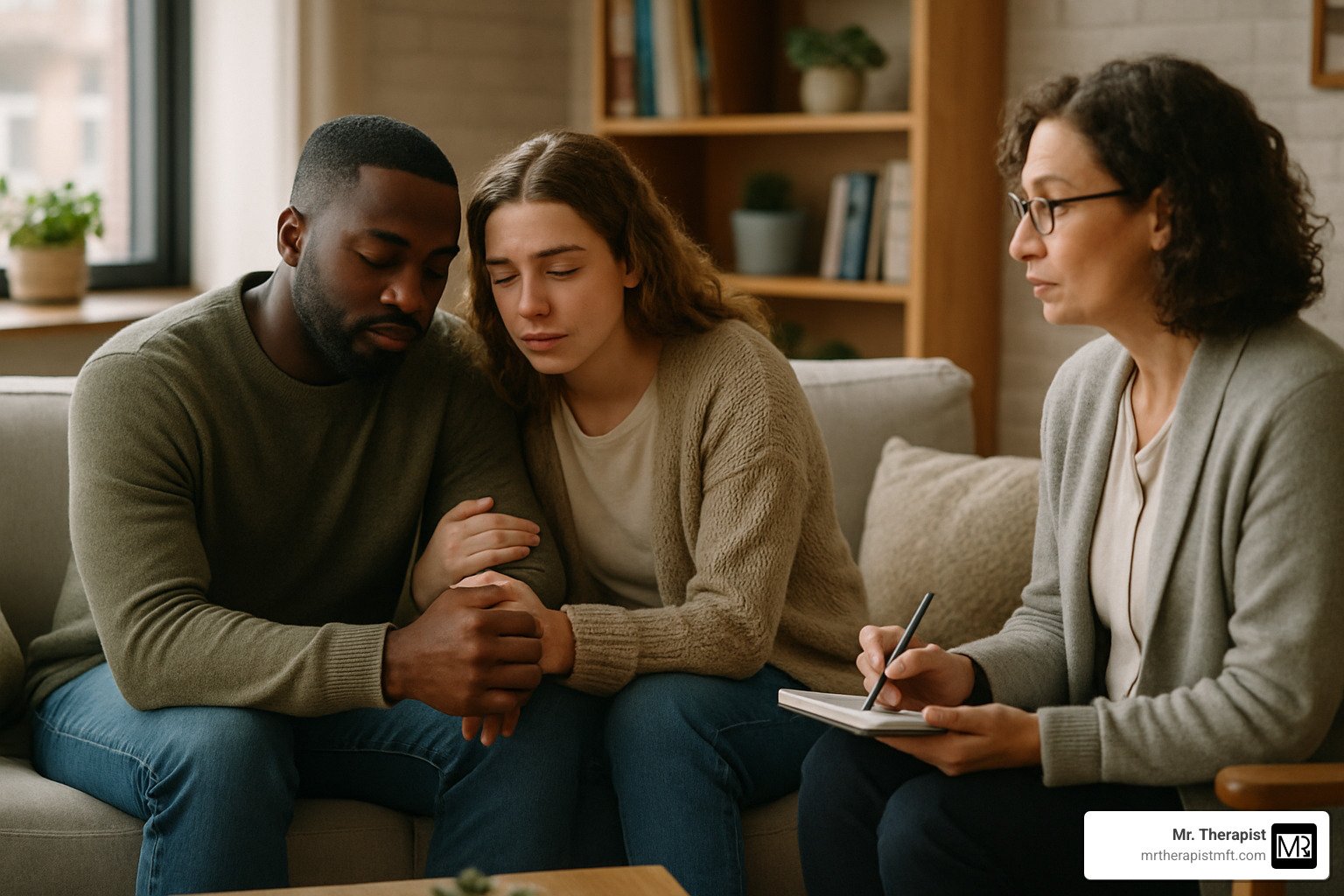
Anxiety and depression help for young adults is vital as these mental health challenges are becoming more prevalent. Many young men and women face pressure from social media, academic expectations, and financial concerns.
Quick answers on anxiety and depression help include:
- Talking to someone trusted, like a parent, teacher, or friend
- Visiting a doctor for a professional diagnosis
- Engaging in therapy or counseling
- Considering medication when recommended by a healthcare provider
- Exploring lifestyle changes like regular exercise and healthy eating
Young adults, defined here as individuals aged 18 to 30, are experiencing anxiety and depression at greater rates than ever before. This increase not only affects their mental health but also their educational, professional, and personal lives. Many young adults find it hard to transition into adulthood due to “transition cliffs” in mental health services when they age out of pediatric care.
My name is Emmanuel Romero, and I’ve worked extensively in the mental health field, especially focusing on Anxiety and depression help for young adults. With experience ranging from university counseling to running a private practice, I understand the unique challenges young adults face. Let’s dive deeper into these issues and explore how we can help.

Understanding Anxiety and Depression in Young Adults
Anxiety and depression are increasingly common among young adults, affecting millions across the United States. According to research, young adults aged 18 to 30 are particularly vulnerable to these mental health issues. The rise in anxiety and depression help for young adults is crucial as these disorders can significantly impact their lives.
Prevalence
Recent studies indicate that nearly 10% of the nation’s youth experience severe major depression. This alarming statistic highlights the urgent need for effective mental health support. The COVID-19 pandemic has only exacerbated these issues, with young adults reporting higher levels of anxiety and depression than ever before.

Symptoms
Recognizing the symptoms of anxiety and depression is the first step toward getting help. Symptoms can vary, but common signs include:
- Persistent sadness or irritability
- Difficulty sleeping or oversleeping
- Changes in appetite or weight
- Loss of interest in activities once enjoyed
- Difficulty concentrating
- Feelings of worthlessness or excessive guilt
- Thoughts of death or suicide
Symptoms might manifest differently in young adults compared to older individuals. For instance, young adults might exhibit irritability more often than sadness.
Risk Factors
Several factors contribute to the increased risk of anxiety and depression among young adults:
- Social Media: Excessive use can lead to feelings of inadequacy and social isolation.
- Academic Stress: High expectations and pressure to succeed academically can be overwhelming.
- Economic Stress: Concerns about job prospects and financial stability add to the burden.
- Life Transitions: Moving from adolescence to adulthood involves significant changes that can be stressful.
In addition to these, genetic predispositions and family history also play a role in an individual’s susceptibility to anxiety and depression.
Understanding these aspects is crucial in addressing the mental health challenges faced by young adults. By recognizing the prevalence, symptoms, and risk factors, we can better support those in need and guide them toward effective treatment options.
Next, we’ll explore various treatment options available for young adults facing anxiety and depression.
Treatment Options for Anxiety and Depression
When it comes to anxiety and depression help for young adults, there are several effective treatment options available. These include psychotherapy, medication, and lifestyle changes. Each approach can be custom to meet the unique needs of individuals, providing a pathway to improved mental health.
Psychotherapy
Psychotherapy, often referred to as “talk therapy,” is a cornerstone in treating anxiety and depression. Cognitive Behavioral Therapy (CBT) is especially effective, showing a 46% improvement in anxiety symptoms among treated individuals.

CBT helps young adults identify and change negative thought patterns and behaviors. It’s particularly beneficial for those dealing with anxiety and depression, as it equips them with practical coping strategies.
Solution-Focused Brief Therapy (SFBT) is another option, with studies showing a 28.2% improvement in symptoms over a few months. This therapy focuses on building solutions rather than dwelling on problems.
Medication
For some young adults, medication can be a vital part of treatment. Antidepressants, such as SSRIs, have been proven effective for managing symptoms of depression and anxiety. However, it’s crucial for individuals to consult with a healthcare provider to find the right medication and dosage.
While medication can significantly help, monitor for any side effects and regularly assess its effectiveness with a healthcare professional.
Lifestyle Changes
Incorporating healthy lifestyle changes is another powerful way to combat anxiety and depression. Simple adjustments can have a substantial impact on mental well-being:
- Regular Exercise: Physical activity releases endorphins, which improve mood and reduce stress.
- Healthy Eating: A balanced diet supports overall brain health and can stabilize mood.
- Sleep Hygiene: Establishing a regular sleep routine helps regulate emotions and improve mental clarity.
- Relaxation Techniques: Practices like yoga and meditation can reduce stress and promote relaxation.
Young adults are encouraged to set small, achievable goals in these areas to gradually improve their mental health.
By understanding and utilizing these treatment options, young adults can better manage their anxiety and depression. Next, we’ll dig into how support networks, professional help, and self-care strategies can further aid in their journey to mental wellness.
Anxiety and Depression Help for Young Adults
Navigating anxiety and depression help for young adults involves a combination of support networks, professional guidance, and self-care strategies. Each plays a critical role in fostering mental well-being.
Support Networks
Support networks are the backbone of mental health support. They provide young adults with a sense of belonging and understanding. Here’s how they can help:
-
Family and Friends: Encouraging open conversations with trusted individuals can alleviate feelings of isolation. It’s important for young adults to know they are not alone.
-
Peer Support Groups: Connecting with others who have similar experiences can be incredibly validating. These groups offer a safe space to share challenges and coping strategies.
-
Online Communities: Virtual platforms can be a lifeline, especially for those hesitant to seek in-person support. Websites like ReachOut and headspace offer forums and resources custom to young adults.
Professional Help
Professional help is a crucial step in managing anxiety and depression. It provides structured support and expert guidance:
-
Counseling Services: Many universities and community centers offer low-cost or free counseling custom to young adults. According to a survey, 52.45% of colleges provide psychiatric evaluations, highlighting the availability of these services.
-
Therapists and Psychologists: Licensed professionals can provide evidence-based therapies like CBT and SFBT, proven to improve symptoms significantly.
-
Virtual Care Tools: Innovations like Sutter Health’s virtual care tool offer accessible mental health support through telehealth, making it easier for young adults to receive help without leaving home.
Self-Care Strategies
Self-care is a powerful tool in managing mental health. It empowers young adults to take charge of their well-being:
-
Exercise: Engaging in regular physical activity can boost mood and reduce anxiety. Even short daily walks can make a difference.
-
Healthy Eating: A nutritious diet supports brain health. Incorporating fruits, vegetables, and whole grains can help stabilize mood.
-
Mindfulness and Relaxation: Techniques like meditation and deep breathing exercises promote calmness and reduce stress.
-
Creative Outlets: Activities such as painting or writing can provide an emotional release and improve mood.
-
Routine: Establishing a daily routine with set times for sleeping, eating, and relaxing can provide structure and reduce overwhelm.
By leveraging these support networks, professional help, and self-care strategies, young adults can find effective anxiety and depression help. Next, we’ll explore innovative therapies and emerging treatments that are shaping the future of mental health care.
Innovative Therapies and Emerging Treatments
In the quest for effective anxiety and depression help for young adults, innovative therapies and emerging treatments are making a significant impact. These approaches offer new hope for those who may not have found relief through traditional methods.
Cognitive Behavioral Therapy (CBT)
Cognitive Behavioral Therapy (CBT) is a widely recognized and effective treatment for anxiety and depression. It helps individuals identify and change negative thought patterns and behaviors. Research shows that CBT can lead to a 46% clinical improvement in anxiety symptoms. It’s especially beneficial for young adults, as it equips them with coping skills that can be used throughout life.
-
How it Works: CBT involves structured sessions with a therapist, where patients learn to challenge distorted thoughts and develop healthier thinking patterns.
-
Benefits: It’s a practical, hands-on approach that empowers young adults to manage their symptoms actively.
Mindfulness-Based Interventions
Mindfulness involves focusing on the present moment without judgment. This practice can significantly reduce symptoms of anxiety and depression by promoting relaxation and self-awareness.
-
Mindfulness Techniques: These include meditation, deep breathing exercises, and yoga. They help calm the mind and reduce stress.
-
Impact: Studies indicate that mindfulness-based interventions can effectively reduce depressive symptoms and improve overall mental well-being. They offer young adults a tool to manage their emotions and stressors in a more balanced way.
Transcranial Magnetic Stimulation (TMS)
For those with treatment-resistant depression, Transcranial Magnetic Stimulation (TMS) offers a promising alternative. TMS is a non-invasive procedure that uses magnetic fields to stimulate nerve cells in the brain.
-
How it Works: During a TMS session, an electromagnetic coil is placed against the scalp. The coil sends magnetic pulses to the brain regions involved in mood regulation.
-
Benefits: TMS is particularly useful for young adults who haven’t responded to traditional talk therapy or antidepressant medications. It provides a new avenue for relief and has been shown to improve mood and reduce depressive symptoms.
These innovative therapies and emerging treatments provide a broader range of options for young adults seeking anxiety and depression help. They complement traditional methods, offering new avenues for healing and hope. Next, we’ll address some frequently asked questions about accessing mental health services and understanding the role of social media in mental health.
Frequently Asked Questions about Anxiety and Depression Help for Young Adults
What are the signs of anxiety and depression in young adults?
Recognizing the signs of anxiety and depression is crucial for early intervention. Symptoms of depression often include prolonged sadness, irritability, changes in appetite or sleep, and withdrawal from social activities. Anxiety might manifest as excessive worry, restlessness, and difficulty concentrating.
- Diagnosis: A comprehensive assessment by a licensed health professional is essential. This ensures that the symptoms are not part of another mental health condition, as depression often co-occurs with anxiety.
How can young adults access mental health services?
Accessing mental health services can be challenging due to several barriers. However, there are available resources that can help.
-
On-Campus Counseling: Many colleges offer counseling services with low or no attendance fees, making them accessible for students.
-
Virtual Care Tools: Platforms like Sutter Health’s virtual care tool provide telehealth options, especially useful for those who prefer online interactions.
-
Barriers: Common obstacles include financial constraints, stigma, and time limitations. For instance, 42% of young adults report being unable to afford therapy, and 38.9% believe their issues will resolve on their own.
What role does social media play in mental health?
Social media has a significant impact on the mental health of young adults.
-
Impact: While it can offer support and community, excessive use is linked to increased anxiety and depression. It’s important to balance online interactions with real-life connections.
-
Risks: The pressure to maintain a perfect online presence can lead to feelings of inadequacy and low self-esteem. Additionally, exposure to negative content can exacerbate symptoms of anxiety and depression.
Understanding these aspects can help young adults and their caregivers steer the complexities of mental health challenges. For more insights, we’ll explore the importance of emotional resilience and support systems in the next section.
Conclusion
At Mr. Therapist, we believe that emotional resilience is the cornerstone of overcoming anxiety and depression in young adults. Building this resilience involves understanding and using emotions as tools for healing, a key aspect of our approach.
Our founder, Manny Romero, has dedicated his practice to empowering individuals through Emotion-Focused Therapy. This method helps clients in California cultivate emotional awareness and resilience. Our goal is to guide young adults on a transformative healing journey, equipping them with skills to manage life’s challenges confidently.
Support systems play a vital role in mental health recovery. Whether it’s family, friends, or professional networks, having people to lean on can make all the difference. At Mr. Therapist, we emphasize the importance of creating and maintaining these support systems. We offer both individual and family therapy to strengthen these bonds and foster a supportive environment.
Seeking help is a sign of strength, not weakness. Anxiety and depression help for young adults is within reach, and with the right support and resources, recovery is possible. We are here to assist you every step of the way. If you or someone you know is struggling, consider reaching out to us for guidance and support. Together, we can build a future filled with hope and resilience.



